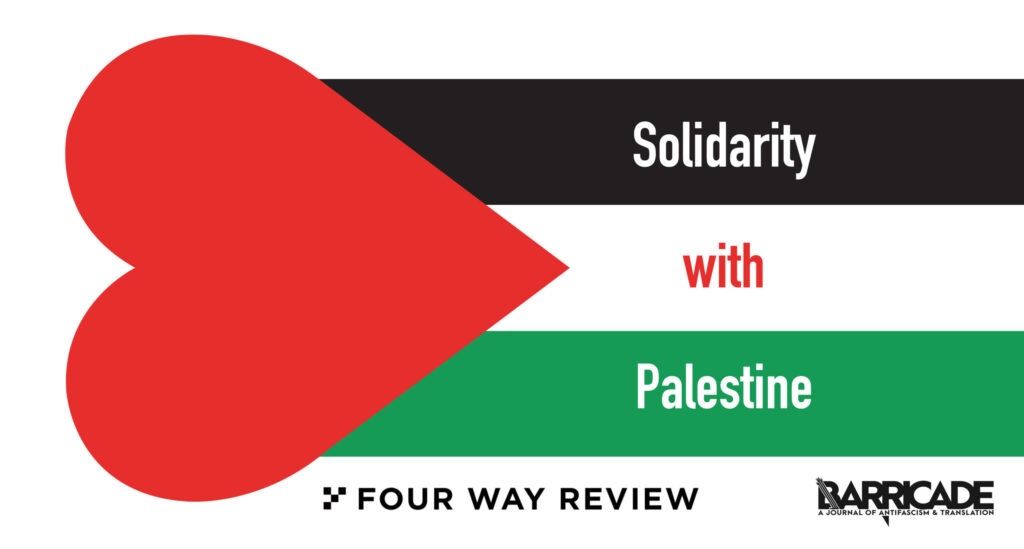
Mobile users: Reading in landscape mode is recommended.
DAY 21, WORDS ARE TOO POOR October 28, 2023

Mobile users: Reading in landscape mode is recommended.
DAY 21, WORDS ARE TOO POOR October 28, 2023
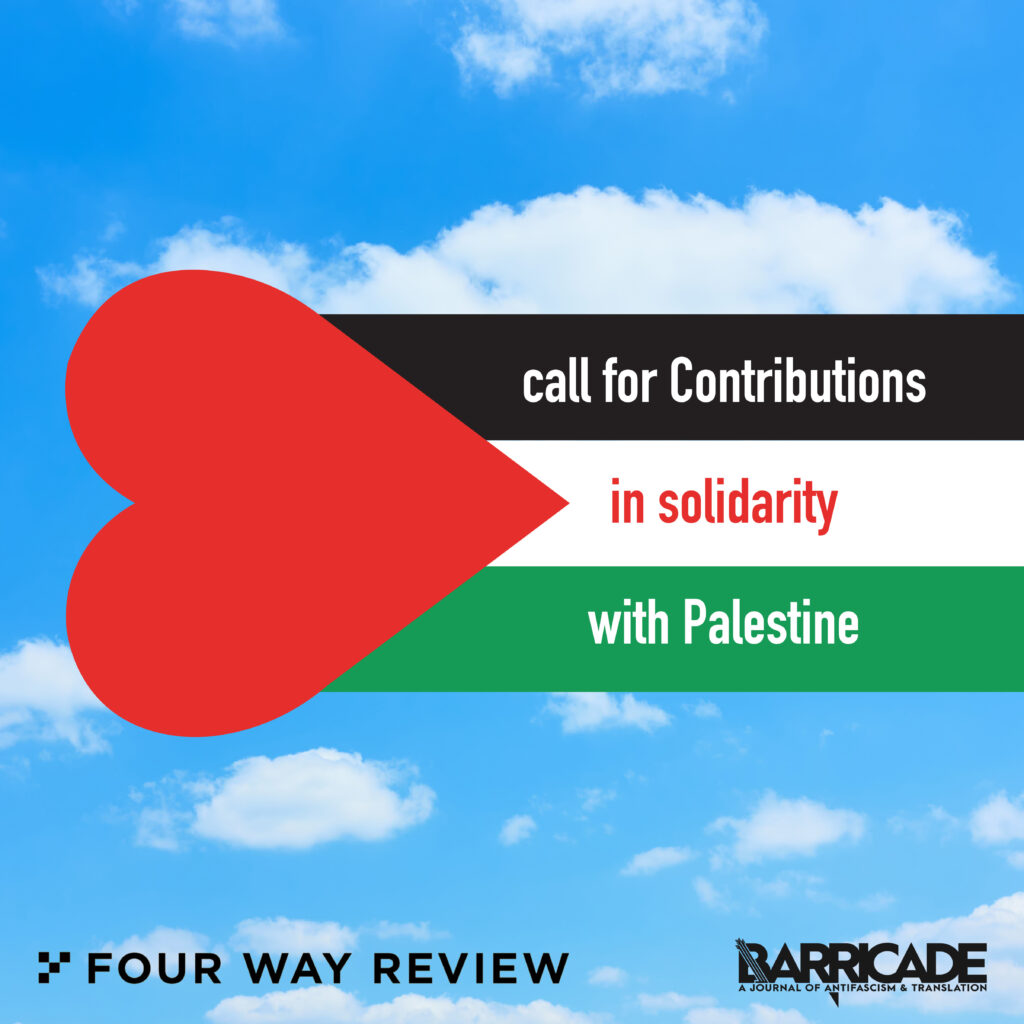
More than three months into Israel’s latest escalation of a decades-long project of state-sponsored genocide of the Palestinian people, Gaza continues to face deadly bombings and attacks from Israel. According to Gaza’s Health Ministry, the death toll of Palestinians is in the tens of thousands, with no sign of Israel relenting.
In addition to our condemnation of Israel’s settler-colonialist project, Barricade and Four Way Review oppose the vehement support of Israel from the United States, which has been and remains complicit in the death and destruction in Palestine. While we stand against Anti-Semitism, we equally condemn Islamophobia, anti-Arab racism and xenophobia, and imperialism, all of which function together to murder and oppress the poor and working classes and to legitimize expropriation and forced displacement.
With this in mind, Barricade is collaborating with Four Way Review in order to use our platforms to uplift and disseminate translations from Palestinian writers, works in translation in solidarity with the Palestinian people, and other relevant works or projects. Barricade will share contributions on its forum Ramparts, a makeshift oppositional online space founded on the basis of urgency and necessity; Four Way Review will compile a selection of Ramparts posts into one of its themed “monthlies” this spring with the aim of expanding the reach of these writings and giving them a more permanent home.
Please email submissions@barricadejournal.org with your poems, essays, manifestoes, and pitches. Submissions will be accepted on a rolling basis until further notice.

Hiba Abu Nada, a Palestinian novelist and poet, and winner of the Sharjah Prize for her novel Oxygen is Not for the Dead, was killed by Israeli airstrikes at her home in Gaza on Oct. 20. She was just 32 years old. The poem below, written by Angolan poet and journalist João Melo, alerts us to the brevity and precarity of the moment, after an act of violence occurs and before the official narrative of that violence is written, how we are obliged to speak in that moment the truth and reality that we know.
João Melo
translated from the Portuguese by G. Holleran
Excuse my urgency, oh right-thinking beings
especially you translucent
and self-referential poets,
but one of our sisters,
the Palestinian poet Hiba Abu Nada,
has just died in Gaza under the shrapnel of a benevolent bomb,
sent by another God,
different from the one she spoke with
every day.
I hesitated to convey this fateful news
so hastily. Perhaps I should wait
for the leaden grey smoke from the bomb that killed her to dissipate,
while she, surely,
scrutinized the sky for a sliver of light and
maybe even
the last birds.
Or, more convenient yet
it’d be better to say nothing,
until today’s hegemonic oracles,
like all oracles,
circulate an official statement
denying it as usual
without any doubts
or uncomfortable questions.
But when I read
the last words of Hiba Abu Nada before she died,
I was moved to spread this news,
before her banner could be censored
by those who defend selective liberty:
“If we die, know that we are content and steadfast,
and convey on our behalf that we are people of truth!”
João Melo, born in 1955 in Luanda, Angola, is an author, journalist, and communication consultant. He is a founder of the Angolan Writer’s Association, and of the Angolan Academy of Literature and Social Sciences. His works include poetry, short stories, articles, and essays and have been published in Angola, Portugal, Brazil, Italy, Cuba, the United Kingdom, and the United States. His writings have been translated into English, French, German, Arabic, and Chinese. He was awarded the 2009 Angola Arts and Culture National Prize in the literature category.
Grace Holleran is a writer, translator, and member of Barricade‘s editorial collective.
To read Barricade’s statement in solidarity with Palestine in response to the last escalation by Israel in 2021, click here.
For updates on local actions and demonstrations, we recommend checking the social media of local Palestinian advocacy organizations. For on-the-ground coverage in Gaza, we recommend Middle East Eye, Jewish Voice for Peace, and Motaz Azaiza. A list of other Instagram accounts can be found in the caption of this post. While social media gives visibility to the immediacy of the conditions in Gaza not shown in mainstream media, these accounts are also subject to censorship by Meta, so watch this space for updated links.
Some useful resources for education on Palestine’s history are Jadaliyya’s comprehensive reading list from 2021 and their currently-running Gaza Teach-in series (which can be accessed here along with other recent posts on Palestine), and Decolonize Palestine.
Country of Words is a rich resource for Palestinian literature, a re-mapping of Palestine’s literary history from a global perspective.
If you have the resources, consider donating to the Palestine Children’s Relief Fund, Medical Aid for Palestine’s urgent appeal, and Pal Legal (which gives protections to those losing their livelihoods for speaking out).
We urge readers in the United States to call and write their Congress representatives and demand they stand for a ceasefire.
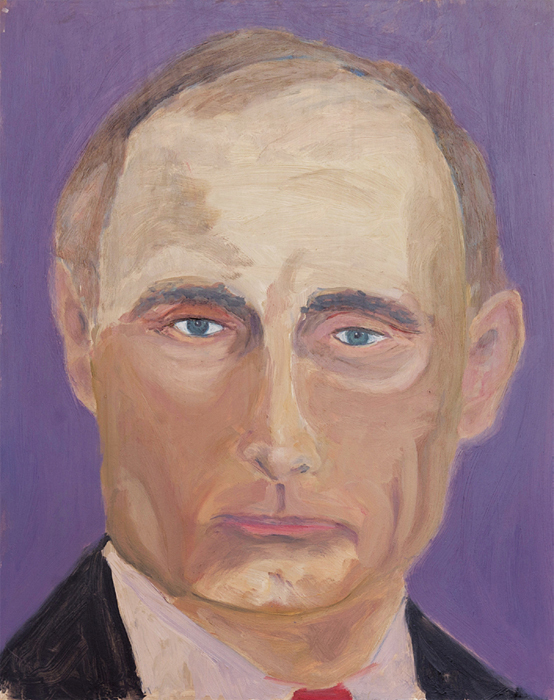
Barricade stands in solidarity with the people of Russia and Ukraine who have become unwitting victims of a totally indefensible war initiated by Russian president Vladimir Putin and his oligarchic administration, a crisis that has, in a matter of weeks, led to the displacement of millions of ordinary citizens, driven Europe to the brink of another major refugee crisis, and resulted in thousands of military and civilian casualties. Putin’s attack—alongside his refusal to acknowledge Ukraine as a legitimate state with a democratically elected government—is not just territorial but ethnic and is fueled by a misplaced nostalgia about a purportedly glorious Soviet past. We at Barricade condemn this invasion of a sovereign state by a foreign dictator that has resulted in the destruction of thousands of human lives and livelihoods.
But even as we denounce Putin’s war on Ukraine and his escalating rhetoric around nuclear weapons, we also want to call out the double standards of the United States and mainstream Western media for their convenient elision of the West’s own complicity in the crisis, especially its involvement in NATO’s capital-driven expansionist policies. We express our solidarity for the working people of both countries and mark our protest not only against the war initiated by Putin but also the global neoliberal network founded on an economy of extraction and the maximization of profits. We believe that a war is inseparable from the way we tell the story of the war, and that the US’ (justified) denunciation of Putin also serves to conceal the equally egregious sovereign-territorial invasions the US has made this century, notably in Iraq and Afghanistan in the guise of a “war on terror,” but in erstwhile Yugoslavia as well in 1999 in total disregard of the UN Charter. The current crisis should, therefore, not make us forget the fact that the US and its allies have on several occasions used force to invade and interfere in the internal affairs of other nations, undermined their territorial independence, and brought about regime changes to suit its own geopolitical needs—and that the effects of these actions reverberate and are amplified in hardly unforeseeable dimensions, causing more death, impoverishment, despair, and further conflict, long after such “operations” are “accomplished.”
Excursus on the artist and his art
To illustrate the risk of the ease with which US imperial war crimes can be and have been elided or painted over by emerging geopolitical crises—not to mention by our national desire to obfuscate and forget—former president George W. Bush has gifted us a remarkable example. Since retiring from political life, Bush has—like another wartime leader before him, Winston Churchill—taken up painting. Unlike Churchill, who waxed romantic in a famous essay on the pleasures of plein air painting, Bush’s paintings are primarily portraits. Yet not unlike Churchill, whose essay explicitly analogizes the (ostensibly) purposeless activity of art-making with the (overtly) purposive activity of war-making, Bush’s paintings serve an implicit political function. Adam Taylor of the Washington Post wrote in 2014 of Bush’s portrait of Putin: “it is a really good painting aesthetically.” While it’s tempting to sneer at a foreign policy reporter’s aesthetic judgments—and tempting, but less so, to recall that “Hitler was actually a kinda good artist”—what’s more telling is that this comment is smuggled in between parentheses. For this is how revision and rehabilitation of the narrative begins. Matt Saunders, writing also in 2014, but for Artforum—a venue in which one might reasonably expect to encounter credible aesthetic judgments—describes a certain “haplessness” in the painter’s hand: “he moves the paint with carefree gumption.” And yet, Saunders foregoes the opportunity to analogize Bush’s hapless way of moving paint with his hapless art of war or with his carefree gumption in Guantanamo, Iraq, Afghanistan, prompting instead: “The ex-president defines himself as a painter, but do we define him as an artist?” We at Barricade would like to suggest that the portrait is very often just as much of the artist as it is of the sitter.
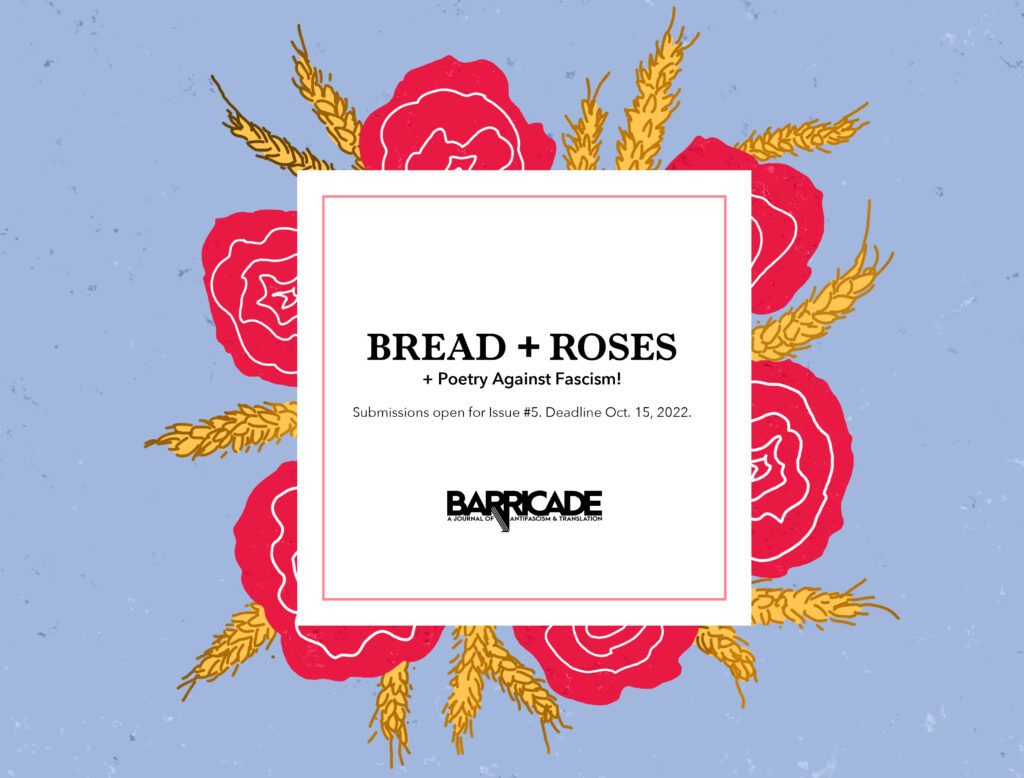
In 1910, women’s rights and labor activist Helen Todd declared that bread—“which is home, shelter, and security”—is just as necessary to life as roses—“music, education, nature and books.” The slogan “Bread and Roses” immediately became a rallying cry for a successful textile workers’ strike in Massachusetts in 1912, before going on to have a career in song and strike actions far beyond this moment.
The table and the imagination: the one inconceivable without the other.
Barricade wants to publish your translations of this and like-minded demands, from all places and times where the forces of capital and reaction have sought to separate them.
Issue #5 will emphasize poetic voices raised in protest, from song lyrics to epic narrations, to aphorisms, to word art. While poetry will be our focus, we will still also consider prose submissions.
See our Submissions page for details on how to submit your translation manuscript. Deadline for the present call: October 15, 2022.
Given their fixation on a very particular conception of “tradition,” it should come as no surprise that participants in the alt-right and other closely related movements have regularly adopted language that connects them with figures from the past whose personal mythologies appear useful for their movements’ ends. One manifestation of that is in the very names that participants choose when they want to obscure or alter their identities.
Continue reading “The Alt-Right Name Game”One moment from August 12, 2017 that was discussed repeatedly during the course of the Sines trial was the march by members of League of the South (LOS), the Traditionalist Workers Party (TWP), and the National Socialist Movement (NSM) – groups that formed a coalition known as the Nationalist Front (NF) – from a parking garage on Market Street in Charlottesville to what was then called Emancipation Park about two blocks away (the park was previously named Lee Park and has since been renamed once again as Market Street Park). The conflict that occurred when that particular bloc of far right demonstrators clashed with counter-protesters was one of the most dramatic and widely documented events in an already tense and tragic day.
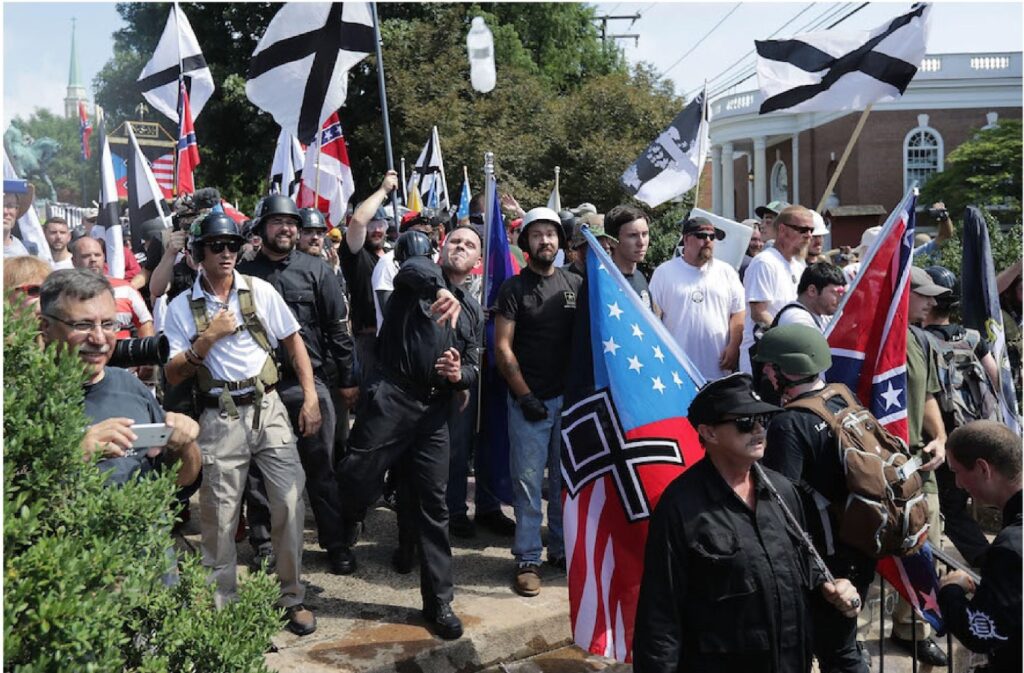
The NF bloc clearly came prepared to fight: many members of LOS and TWP wore helmets and carried uniform police riot shields. A number of them also had flagpoles that quickly became weapons (a practice that was frequently discussed on message boards beforehand). That day in Charlottesville, there were also antifascists who brought helmets, shields, and sometimes flagpoles, but as the NF members approached the park, they were confronted by a line of people who were simply locking arms with little to nothing to protect them. This fact makes the footage of that moment all the more gut-wrenching to watch. Ultimately, the NF groups all made their way into the park.
Continue reading “On Borrowed Language and Historical Continuity on the Far Right”In November 2016, Richard Spencer’s public profile took on a new degree of notoriety when The Atlantic released video of a speech he gave at the annual conference of the National Policy Institute, a white nationalist think tank then under Spencer’s leadership. The comment that yielded the most headlines came at the end when he cried out “Hail Trump! Hail our people! Hail victory!” as he raised a cocktail glass with a straight arm at a high angle to a cheering audience and at least a few Nazi salutes.
The phrase hail victory is, of course, historically linked to that gesture insofar as it is a translation of the German Sieg heil. That pairing of signs – one verbal and one corporeal – was also commonplace among alt-right participants. In a previously recorded deposition that was presented during the Sines trial, former Identity Evropa member Samantha Froelich was asked if she had heard “either Sieg heil or hail victory discussed within the alt-right.” She answered, “yes, at every social event I went to, that was said” and explained that it was associated with “the Roman or Nazi salute.” She even described a joke that was passed around among Identity Evropa members “where you would ask if you’ve seen my friend Kyle. ‘Did you see Kyle?’ Sieg heil? I hope you understand the wordplay here. And then you would do the Sieg heil and say, ‘Oh, he’s right over there’ and point your finger. ‘He’s about this tall’ [indicating a Nazi salute] and that was – that was the joke, is that you’re Sieg heil-ing in plain day.” Continue reading “The Sanctifying Language of the Alt-Right”
[The following is part of an ongoing series about Sines v. Kessler, the civil suit against many of the main organizers of the August 2017 Unite the Right (UTR) rally in Charlottesville, Virginia. For an overview of the suit’s objectives and its many defendants, please see the first post in the series here.]
Courtrooms have long been sites for grand ideological statements. Before he was sentenced to hang for the 1886 Haymarket bombing (despite a distinct lack of evidence against him and his co-defendants), August Spies renounced none of his beliefs and instructed the jury that “socialism, in short, seeks to establish a universal system of co-operation.” Before receiving a ten year prison sentence in 1918, Eugene V. Debs declared that “I ask no mercy. I plead for no immunity. I realize that finally the right must prevail. I never so clearly comprehended as now the great struggle between the powers of greed on the one hand and upon the other the rising hosts of freedom.”
As a venue, however, courtrooms are also available to actors with far less noble sentiments. For one example, a week and a half into the Sines v. Kessler trial, it is clear that defendant Christopher Cantwell intends to continuously take advantage of his status as a pro se defendant to bully witnesses in cross-examination, expound on his beliefs, and rehabilitate his tarnished image among his overtly fascist constituency.
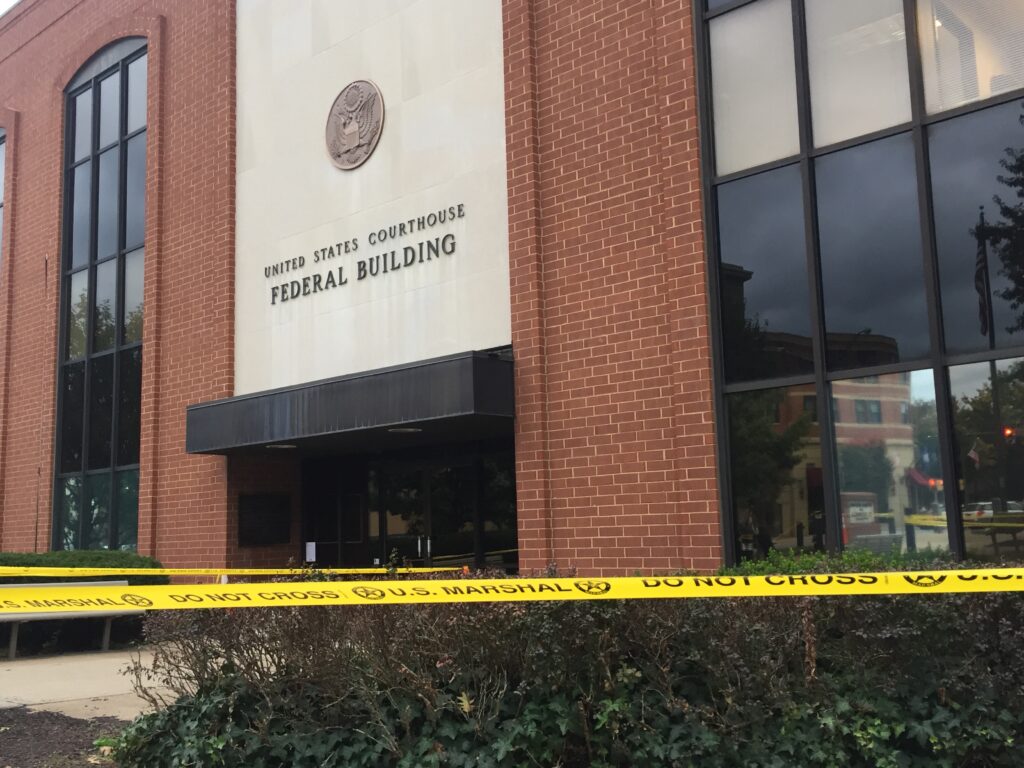
By the time he went to prison last year for threats and extortion directed at neo-Nazi rivals, Cantwell had gone from being a popular movement podcaster in the days leading up to Unite the Right to virtual pariah status. The reason for his fall was not so much his aggression toward a fellow fascist or even the infamous teary rant that earned him the “Crying Nazi” nickname, but rather the fact that he had admitted publicly to being an informant for federal agents. Working for domestic intelligence services isn’t exactly uncharted territory among far right actors, but it nonetheless confers a treasonous stench that cannot easily be washed away (as Proud Boys leader Enrique Tarrio has been learning in recent months). Still, as a movement invested in gestures of hypermasculine dominance and obsessed with martyrdom, fascists often reward audacious displays, even when they are strategically ill-advised.
[The following is part of an ongoing series about Sines v. Kessler, the civil suit against many of the main organizers of the August 2017 Unite the Right (UTR) rally in Charlottesville, Virginia. For an overview of the suit’s objectives and its many defendants, please see the first post in the series here.]
After two and a half long days of questioning potential jurors, the jury in the federal civil suit Sines v. Kessler has finally been impaneled. The following are some notes about how the jury selection process played out in this case and some of the pitfalls of using the courts to pursue far right actors.
Continue reading “Jury Selection in the Unite the Right Civil Trial and the Limits of Legal Action”